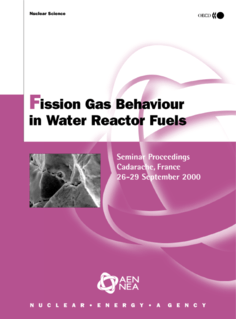Hello! You're looking at a policy document report on Overton
We track government policy, guidelines, think tank research, working papers and more to help our customers see the impact and influence of their work. Are you interested in seeing what information we have to offer? Request a free trial to our platform.
If you fund, produce or manage research or work to influence policy, we'd love to talk. Learn more on our homepage.

Identifiers
Fission Gas Behaviour in Water Reactor Fuels
NEA
During irradiation, nuclear fuel changes volume, primarily through swelling. This swelling is caused by the fission products and in particular by the volatile ones such as krypton and xenon, called fission gas. Fission gas behaviour needs to be reliably predicted in order to make better use of nuclear fuel, a factor which can help to achieve the economic competitiveness required by today's markets. These proceedings communicate the results of an international seminar which reviewed recent progress in the field of fission gas behaviour in light water reactor fuel and sought to improve the models used in computer codes predicting fission gas release. State-of-the-art knowledge is presented for both uranium-oxide and mixed-oxide fuels loaded in water reactors.
Topics in this document
Nuclear fuel
Nuclear reactor
CANDU reactor
Burnup
Chemistry
Nuclear physics
Nuclear energy
Physical sciences
Energy technology
Nuclear technology
Uranium
Nuclear power
Fissile material
Gas
Nuclear fuel cycle
Light-water reactor
Reprocessed uranium
Pressurized water reactor
Spent nuclear fuel
Materials
Nuclear fission
Diffusion
Uranium dioxide
Xenon
Fuel
Boiling water reactor
OECD
MOX fuel
Fracture
Microstructure
Citations
Cited by 3
other policy documents
(1 of them are from other policy sources)
